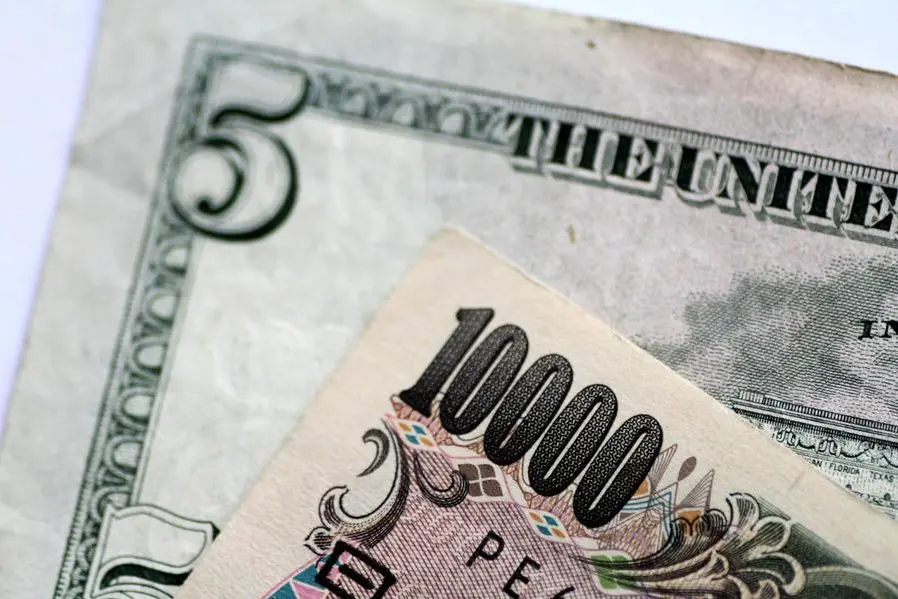PHOTO
SINGAPORE: The dollar was on the front foot on Wednesday, pinning the yen near its lowest its decades though the heightened threat of currency intervention by Tokyo capped further declines in the Japanese currency.
The yuan was steady after a private-sector survey showed that China's services activity growth accelerated in March, in a sign sentiment was staging a tentative recovery in the world's second-largest economy.
The yen was last at 151.585 per dollar, languishing near last month's slump to 34-year lows of 151.975 in the wake of the Bank of Japan's historic policy shift.
While the BOJ raised rates for the first time in 17 years, policymakers' commitment to go slow on further increases have hammered the yen especially given the still-wide Japan-U.S. yield gap.
Japanese officials have carried on with their jawboning efforts for days now in a bid to defend the currency, with the overhanging threat of an intervention serving as stiff resistance for the greenback at the 152 yen level, which some market participants see as a line in the sand.
"Any direct response to (yen) depreciation is more likely to come from the Ministry of Finance," said Morgan Stanley MUFG Securities strategist Koichi Sugisaki in a note.
"We would not expect any unilateral JPY-supportive intervention to trigger more than a temporary decline in USD/JPY given that such action would say nothing about the future direction of monetary policy. That said, we do see potential for intervention to trigger sharper-than-usual falls."
Elsewhere, the euro rose 0.02% to $1.0772, standing some distance away from an over one-month low hit in the previous session, after the U.S. dollar ran into some profit-taking late overnight.
Sterling slipped 0.08% to $1.25675.
The dollar, which on Tuesday touched a nearly five-month high of 105.10 against a basket of currencies, was last steady at 104.76.
The greenback's charge higher this week has come on the back of yet another run of resilient U.S. economic data, which showed manufacturing growing for the first time in 1-1/2 years in March, a greater-than-expected rebound in new orders for U.S.-manufactured goods, as well as a still-resilient labour market.
"Markets have generally scaled back their expectations for FOMC rate cuts in recent weeks, given the strength of the U.S. economic data and pushback from FOMC officials," said Carol Kong, a currency strategist at Commonwealth Bank of Australia (CBA).
"I think the dollar will hold up pretty well in the near term, and that will be a headwind for the other major currencies."
Traders now expect just about 70 basis points worth of rate cuts by the Federal Reserve this year - less than the central bank's projections, with the start of an easing cycle only fully priced in for July.
Fed officials have also signalled that they are in no rush to ease rates.
The Chinese yuan, which has been shaken by a resurgent greenback, last stood at 7.2341 per dollar in the onshore market , languishing near a 4-1/2-month low hit on Tuesday.
Its offshore counterpart slipped 0.03% to 7.2572 per dollar.
The yuan's slide has come despite some brighter manufacturing data at home, including Wednesday's service sector release. A private survey showed earlier this week that China's manufacturing activity expanded at the fastest pace in 13 months in March, which followed equally upbeat official readings released over the weekend.
The general view among analysts is that it is still too early to celebrate positive data outcomes as a protracted property sector crisis remains a major drag on the world's second-largest economy and investor confidence.
"Market participants will still try to push CNH lower because of the economic headwinds facing the Chinese economy. Fundamentals still suggest that a weaker CNH is likely in the near term," said CBA's Kong.
The Australian and New Zealand dollars, which are often used as liquid proxies for the yuan, have likewise come under pressure as a result of a stronger dollar and a weaker yuan.
The Aussie edged 0.12% lower to $0.65095, while the kiwi eased 0.18% to $0.5959.
(Reporting by Rae Wee; Editing by Shri Navaratnam)





















